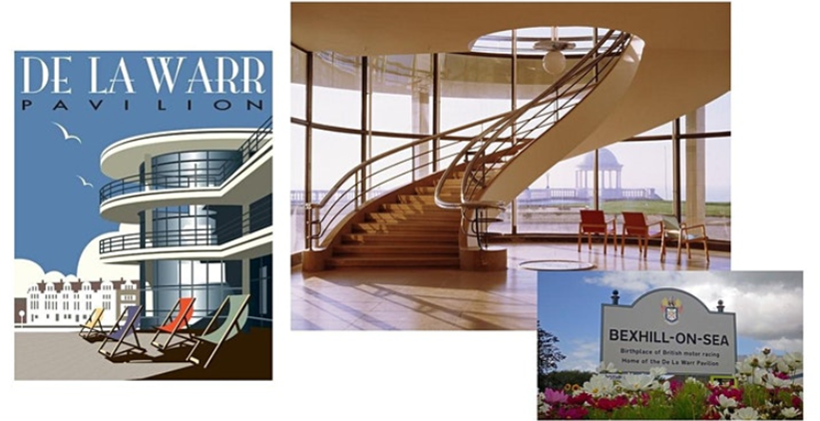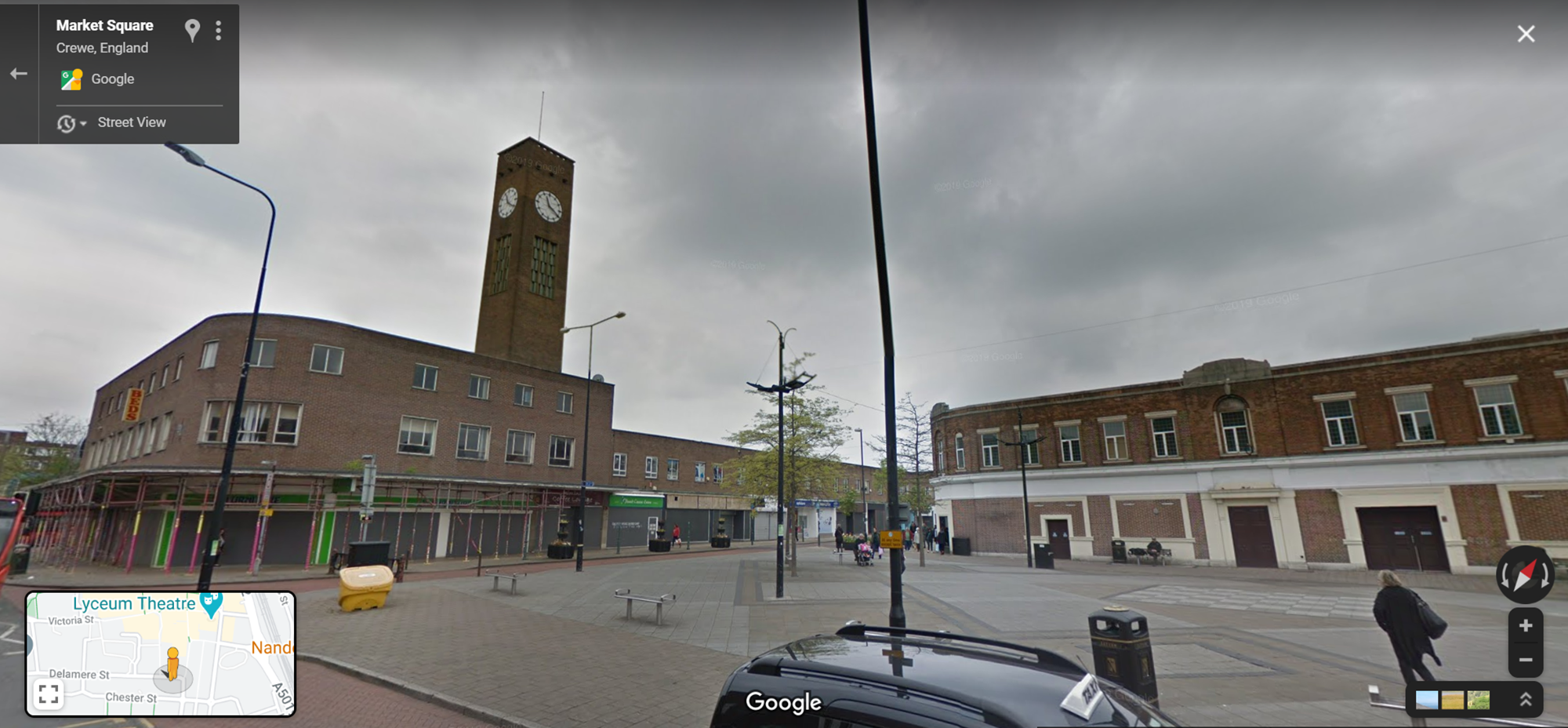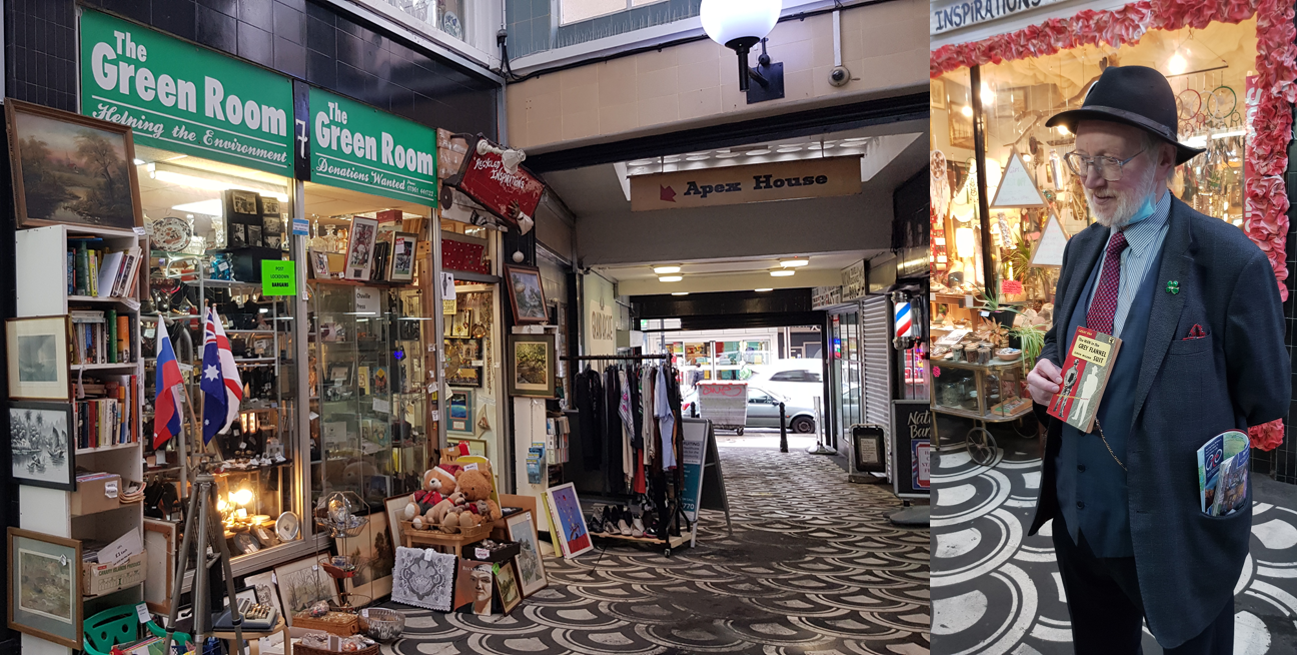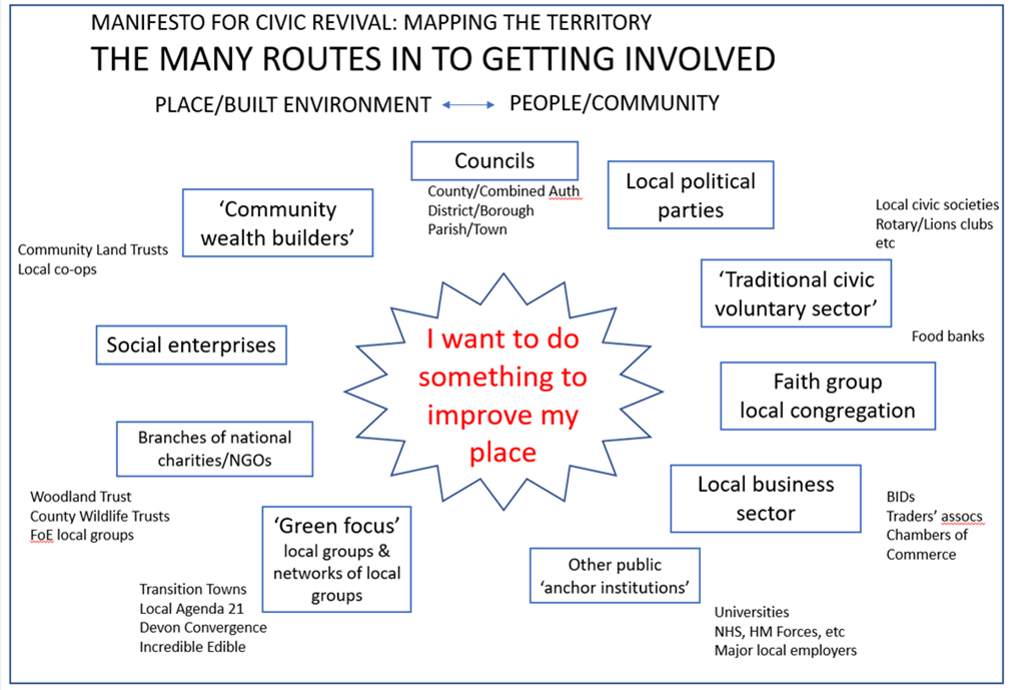A wide range of current issues and concerns amongst civic activists from places including Bexhill, Crewe, Lancaster, Coalville, Gillingham, Farnham and North Finchley were identified through the first online discussion in Civic Revival’s five-part series, taking place over the months in the run up to the launch of a Civic Revival manifesto ahead of next May’s local elections.
Read the report of the event 'A manifesto for the civic revival: mapping the territory' below, and watch the video of it at the foot of this article
Contributions from localist campaigners in seven towns across England formed the core contribution to the online discussion on October 29th, following introductions by Civic Revival founders Peter Stonham and Richard Walker, and long-time community engagement specialist Nick Wates.

The Civic Revival manifesto concept is being developed in conjunction with Flatpack Democracy 2021, led by Peter Macfadyen from Frome in Somerset. Flatpack 2021 is the "national campaign to help communities reclaim their local councils", and seeks to replicate and extend to other places the success of political independents in Frome of re-energising their local town council.
The aim of the Civic Revival manifesto is to challenge those standing for election to local councils next May on their commitment to localism, and willingness to support initiatives for greater autonomy and democracy, and to give more recognition and resources to those citizens seeking to help enhance the places they live. The principles are based on Civic Revival’s five inter-connected building blocks that underpin localism.
Peter Stonham introduced Civic Revival, and those 5 key civic building blocks, embodied in its logo.
He said that Civic Revival’s position was unique, in not being concerned with any one specific subject area or policy, but in being interested in civic activism in its broadest sense, and how it manifested in different ways. He then presented the focus of the session: the current dynamic for doing things differently at the local level, and the need for action now to foster civic revival and new local democratic empowerment. To do this, though, he believed that it was important to bypass ‘traditional’ political labelling, in favour of concerns and opportunities being addressed by ‘ordinary’ local people, on the local level.
Richard Walker then presented an approach to ‘mapping the territory’ of civic activism - the "many routes in to getting involved" with civic activity aimed at improving your own town, village or neighbourhood, from traditional approaches, such as running for the council, or working through established charities or business associations, through to approaches that start with the aim of radical social or environmental change, and building a new economy. The aim is to produce a manifesto for civic revival that makes sense for the broad range of civically-minded people, whatever their route in to getting involved.
Next, Nick Wates introduced civic activists from a diverse range of places across England to tell their fascinating stories of the campaigns and work they are currently involved with.
Bexhill: Democracy Unlocked

Viv Taylor-Gee and David Gee shared their recent experience of a campaign to establish a Town Council for Bexhill-on-Sea in East Sussex, part of the Rother District Council area. In 2015 they helped establish Democracy for Bexhill, which set the campaign in motion. They brought about a Community Governance Review, and out of 9,000 responses, 93.5% residents expressed desire for a new Town Council for Bexhill.
However, the sitting District Council did not accept these wishes, and nor act on the consultation. And so a group of people stood in the next District elections, on the pledge to form a Town Council. They were wildly successful: 17 of 18 Bexhill Councillors were replaced by Town Council proponents. They kept their pledge, and in December this year, Rother will create a Community Governance Order to establish a Bexhill Town Council.
David then explained some of the practicalities, in that the campaign success was based on the town council starting with a ‘blank sheet of paper’ to genuinely address local concerns. There would be no rush to receive asset transfers from the district yet; there would initially just be a town clerk, two assistants and a small budget. There will be no government grant in the upcoming year, and there will be higher demands than ever with an ageing population and the pressures of Covid, he explained.
To inspire Bexhill residents – and others on a similar journey – David and his colleagues are organising a national conference called Empowering Communities through Localism, on March 28th 2021, hopefully (dependent on the coronavirus situation) at the iconic De La Warr Pavilion in Bexhill. It will be addressed by local, national and international speakers who advocate community empowerment. 15 workshops covering diverse areas from health and wellbeing to participatory budgeting are planned. The aim is to bring people together to think innovatively to generate wealth and prosperity. Civic Revival accepted David's offer to get involved with co-hosting the conference alongside the Bexhill Seafront Group and the new Bexhill Town Council.
Crewe: Misguided Town Centre Thinking

Chris McGarrigle, a chartered surveyor based in Crewe, told the story of a troubled large-scale regeneration project in Crewe town centre that threatens to demolish the existing 1950s Queensway shopping parade fronting the town's market square. The distinctive and characterful clock tower – a key landmark in the town centre - will be lost. Despite there being little prospect of the much-vaunted retail development scheme to replace it being built, given current market conditions and trends, Cheshire East Council seems determined to press ahead with demolition, rather than refurbishment.
Chris pointed out his (and others’) considerable, professionally-informed reservations about the new development, and his unproductive attempts in trying to communicate with the newly established Council-led Crewe Town Board to voice objection. He told of years of experience of trying to generate community-focused projects with local authority officers, but that outside consultants were usually engaged to endorse proposed projects, including the current one.
He said a much better vision for the key town centre site was to reimagine the current buildings as a community space with alternative vibrant uses: outdoor markets, cinema, events etc. However, he was pessimistic about the Council’s interest in this, feeling that they are determined to proceed with a ‘myopic view’ – and predicted that the new town centre development wouldn’t be built even in five years' time, instead there would just be a cleared space as an unproductive void and eyesore.
Lancaster: Liberating Latent Citizen Capacity
In Lancaster, James Wilkie detailed his involvement with Lancaster Civic Society, who work to conserve and improve Lancaster for its local community. In 2012 a sub-group called Lancaster Vision was established, to help support the local authority on strategic development projects.
He focused upon a particular aspect of the vision: ‘liberating latent citizen capacity’. The local authority had a lack of capacity in terms of space and resources, against the challenges of hoping to rebuild and develop. Lancaster Vision therefore positioned itself as an organisation to help unlock community capacity, in direct support of the local authority. He admitted that it has been a ‘hard sell’, but that they had recently embarked upon small projects with the Council.
James argued that there were a lot of people in Lancaster, with skills to offer in particular areas like transport, tourism, education or heritage, that were going untapped, because they were hesitant to get directly involved in too many meetings or bureaucratic processes. Lancaster Vision wants to engage a whole range of people in local communities so that they can express and put to work their passion and knowledge in such specific areas.
Coalville: Community 'CAN Do' Attitude
A common theme emerging throughout the event was empty buildings in towns. Deana Wildgoose, based in Coalville, Leicestershire, highlighted how Community Benefits Societies (CBSs) can be productive agents for change. She explained how Coalville CAN (Community and Neighbourhoods) CBS, set up 2019, aims to become an 'ethical landlord' taking on vacant spaces and buildings in the town, enabling people to set up enterprises and community uses in them, for local benefit. Coalville CAN is looking at several properties in Coalville town centre, including the town's indoor market hall. A particularly interesting prospect is Coalville's old Co-operative department store, currently empty, which the CBS envisions becoming a community/retail, enterprise/coworking/accommodation multi-floor space. Coalville CAN has successfully persuaded the Co-op's asset managers not to recommend that the building be sold off to private developers on the open market, and so the proposed scheme has a prospective way forward.
In support of this and other CBS schemes, Deana mentioned the ‘Wicked Spreadsheet’ tool – an accessible document that allows people to calculate the financial viability of redeploying such buildings and the project management approaches needed. Deana is happy to share details of the Wicked Spreadsheet with any other community benefit organisation, and also offers training in how to use it.
Farnham: Putting Politics to One Side
Speaking from Farnham, Surrey, David Beaman joked that, as a town and district councillor, he felt like ‘a bit of the establishment’ amongst the community activists present. He went on to recount that he has always believed that national politics should not influence local decision-making. He was elected to Farnham Town Council in 2010 as an Independent, and in 2016 formed a group of like-minded people, a party called Farnham Residents, to stand for Waverley District Council. They now hold a majority on both the Town Council and Borough Council, ‘in association - not coalition - with the Labour, Green and Liberal Democrats groups on the council, and one Independent’. David believes the informal arrangement works as the issues of shared concern (such as neighbourhood planning, or escalating business rates) are addressed on a collegiate basis. This work has paid off with the successful development of the Farnham Infrastructure Programme, a copy of which David proudly showed to everyone.
Gillingham: Benevolent Landlord Brings Property Bonus
The focus on empty buildings continued with Anne Hitchcock in Gillingham, Dorset (the Gillingham in Dorset is pronounced with a hard 'G', unlike the bigger town in Kent). Anne owns a large building in the centre of Gillingham, purchased 20 years ago. She and her then-partner redeveloped it into two flats, and two commercial floors. In the past year she has been in the process of linking the commercial floors, and the groundfloor had tenants running a bar/restaurant – although they left in 2019. Since then, the building had been reimagined as being important to the local community. It has small office units, space that is used for meetings/exercise classes, arts exhibitions and training, and at the start of August, opened a new café on the groundfloor.
Anne espoused her commitment as a benevolent landlord to being ‘ethical’ and her wish to maintain a community focus. But she also flagged that financial sustainability was a necessary concern. Anne expressed a strong interest in exploring how buildings can be seen by landlords as a whole as more than simply financial assets, but as community assets – and how this might aid making town centres more sustainable.
North Finchley: Community Shop leads Arcade Campaign

Another innovative community enterprise was The Green Room, set up by Noel Lynch in North London in 1994, and now located in the Grand Arcade in North Finchley. It is a charity shop, designed to also act as an outlet and meeting point for people to talk about local issues. Noel reported that it was described by Time Out as ‘the most interesting charity shop in London’ – akin to an old curiosity shop. However, Barnet Council had decided to demolish the whole area for new development, including the 1930s arcade in which the Green Room is located. Noel says that this is the only place in North Finchley with independent shops. He and others were campaigning to save it, with over 3,000 people currently having signed a petition in support, and a full-page article appearing in The Guardian about the campaign and the support given by The Kinks' guitarist Dave Davies.
Discussion: Sharing Ideas and Information
The discussion was then broadened to the floor, with Nick Wates chairing. The first point was from David Gee, who brought up funding for empty buildings – pointing to several buildings in Bexhill he’d ‘like to save’. He highlighted that there are various funding streams, which it is useful to be ‘in the know’ about, and suggested a list of these potential resources would be a valuable asset to community activists.
Nick asked Chris Dodwell from Hastings to talk a bit about how the town has been successful in various community/capital projects relating to significant buildings. Chris mentioned the example of Hastings Pier, where, following a devastating fire, a community group came together to ‘save’ it (although it was later transferred into private ownership). Other ‘moribund’ parts of Hastings undergoing regeneration included a 1950’s office block, Rock House, and the iconic Observer Building (a redundant printworks), which had both recently been acquired by a community ownership trust. Rock House was now a small business space, and pending a major refurbishment, the Observer Building was currently being installed with a crazy golf course, bar and performance space as a temporary use.
Anne Hitchcock from Gillingham reinforced the point about the need for funding to support interesting old buildings being put to community use. Although she warned that, to receive funding, constraints could be imposed. For example, unexpected administrative costs, or regulations needed to adhere to by funding organisations. Ultimately, she felt that improvements need to be nade from the ‘bottom up’, and that people have to work closely with landlords/property owners/agents, as well as with local authorities (who may also be landlords).
Lessons Learned and Next Steps
Summing up the discussion, Peter Stonham highlighted half-a-dozen themes that had emerged. He agreed with Anne that one of these is the way those dealing with property assets behave, and how it was best for the local community to relate to them. He pointed to a number of Councils (ie Preston) who have tried to embrace an approach to property that eschews investment in huge complexes from external developers. He believed this is a point that might be usefully included in the forthcoming Civic Revival manifesto: a commitment to other solutions than financial gain to outside money when seeking investment in towns.
Another important point to note, he felt, was the value of community instruments (such as Community Benefits Societies), and the value of making a comprehensive list of them, to help those in seeking the best ways to manage and curate large buildings. Peter concluded by encouraging attendees, and others they could introduce, to share information to this end through Civic Revival, as an important means to network and collate a clear narrative and approach.
Richard Walker wrapped up the session by expressing appreciation for the range and diversity of voices and backgrounds who contributed to the session. There were a lot of great ideas for further development. Although there was a large amount of information emerging, he thought it was good that there were five months to process this in preparing the Civic Revival Manifesto, and announced the next event in the series towards that end.
Next Event in Steps Forward for the Civic Revival Series:
19th November, Community Empowerment at the Human Scale: Proof of Concept
This event will be led by Peter Macfadyen, who will offer a case study on Frome and a discussion on the best ways for citizens to take leadership, assert influence and achieve improvements in their local areas.
WATCH THE FIRST FULL CIVIC REVIVAL MANIFESTO DISCUSSION
- Introduction - a manifesto for civic revival Peter Stonham 0:00-11:05
- Mapping the Territory Richard Walker 11:16-18:58
- Bexhill - Democracy Unlocked: Viv Taylor-Gee 19:48-21:42, David Gee 21:42-27:20
- Crewe - Misguided Town Centre Thinking: Chris McGarrigle 27:34-32:56, Ben Wye 33:10-37:44, Richard Weilding 37:45-39:25
- Lancaster - Liberating Latent Citizen Capacity: James Wilkie 40:00-45:16
- Coalville - Community 'CAN Do' Attitude: Deana Wildgoose 45:53-52:30
- Farnham - Putting Politics to One Side: David Beaman 52:43-56:52
- Gillingham - Benevolent Landlord Brings Community Benefit: Anne Hitchcock 57:35-1:05:35
- North Finchley - Community Shop Leads Arcade Campaign: Noel Lynch 1:05:44-1:11:50


